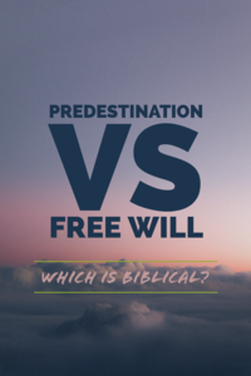Ephesians 1:4-6 (HCSB) 4 For He chose us in Him, before the foundation of the world, to be holy and blameless in His sight. In love 5 He predestined us to be adopted through Jesus Christ for Himself, according to His favor and will, 6 to the praise of His glorious grace that He favored us with in the Beloved.
Do these two and similar scriptures mean that God determined beforehand who will be saved to eternal life and who will be eternally damned, separated from God? If true then what about free will to choose? If true why evangelize? If true then why should I be concerned about my sin because it was predestined by God?
These questions have fueled debate among Christians for centuries.
One crucial point before I continue. Your salvation doesn’t depend on whether you believe in predestination determining your salvation or if you have free will to choose. Your salvation is by God’s grace, whether predestined, or by your free will. You are saved because Jesus paid the penalty for your sins on the cross.
Ephesians 2:8-10 (HCSB)8 For you are saved by grace through faith, and this is not from yourselves; it is God’s gift--9 not from works, so that no one can boast.10 For we are His creation, created in Christ Jesus for good works, which God prepared ahead of time so that we should walk in them.
Jesus Believed In Both Predestination And Free Will
Jesus believed in both predestination (that God has already determined everything that will happen) and free will. He teaches both alongside one another. It is a paradox. The two seemingly contradictory things are both true at the same time.
It is not 50% ‘predestination’ and 50% ‘free will’. Jesus says we are 100% predestined and we have 100% free will. This may seem impossible, but God is able to transcend and yet not distort human freedom. We ultimately see this in the incarnation: Jesus is 100% God and 100% human; he is fully God and fully human.
Predestination
Matthew 11:27 (HCSB)27 All things have been entrusted to Me by My Father. No one knows the Son except the Father, and no one knows the Father except the Son and anyone to whom the Son desires to reveal Him.
The belief in predestination or unconditional election is based on God's sovereignty and omniscience. Sovereignty meaning “in authority over” or “in control over.” We believe God to be in control over everything that happens. So if God is in control over everything, he must also be in control over who is saved and who is not.
Omniscience means “all-knowing.” We believe that God knows the past, present, and future. So, if God knows what will happen in the future, there is no possible way that what he knows will happen could not happen. His knowledge of the future effectively determines the future.
Proponents of predestination say that before creation God chose who would be saved and who would not.
Ephesians 1:4-6 (HCSB) 4 For He chose us in Him, before the foundation of the world, to be holy and blameless in His sight. In love 5 He predestined us to be adopted through Jesus Christ for Himself, according to His favor and will, 6 to the praise of His glorious grace that He favored us with in the Beloved.
Why God chooses to reveal himself to some and not to others is a mystery. It is certainly not based on wisdom and learning.
Matthew 11:25 (HCSB)25 At that time Jesus said, “I praise You, Father, Lord of heaven and earth, because You have hidden these things from the wise and learned and revealed them to infants.
And yet sometimes people of little or no education, or those who are very young seem to have a very profound understanding of Jesus.
Free will
Critics of predestination argue that this view eliminates humanity's free will because it denies human beings the ability to choose salvation or reject it.
From the Holman Bible Dictionary
Human Free Will
The ability the Creator gave people to make meaningful decisions, especially concerning their relationship to God. Because humanity was created in the image of God, freedom is an inherent part of human nature (Genesis 1:26 ). Since this freedom is like God's freedom, it includes the power of choice. Mankind's actions thus derive from the voluntary actions of the human will. Outside forces can influence the human will to take a particular course of action but cannot force it to do so. Free will has been the subject of considerable debate over the years. Biblical evidence indicates that God Himself does not predetermine the choices that mankind will make. This is especially true in relation to God's will (Matthew 23:37; John 7:17 ).
Since God gave mankind the privilege of a free will and then intervened through Jesus Christ when sin changed this freedom to bondage, He gives mankind the privilege to make individual choices. This includes the relation of mankind to God. Salvation and obedience are left to mankind's free will (Romans 10:12-13 ). God elects all people to be saved who will call upon His name (Romans 10:1-21 ). It is left up to the individual's free choice to accept or reject salvation and to accept the consequences of the choice.
Here are some scriptures that proponents of free will use as proof of their argument (Emphasis mine ;
Isaiah 45:22 (HCSB) Turn to Me and be saved, all the ends of the earth. For I am God, and there is no other.
John 3:16 (HCSB) “For God loved the world in this way: He gave His One and Only Son, so that everyone who believes in Him will not perish but have eternal life.
2 Peter 3:9 (HCSB) The Lord does not delay His promise, as some understand delay, but is patient with you, not wanting any to perish but all to come to repentance.
Romans 10:12-13 (HCSB)12 for there is no distinction between Jew and Greek, since the same Lord of all is rich to all who call on Him.13 For everyone who calls on the name of the Lord will be saved.
Revelation 22:17 (HCSB) Both the Spirit and the bride say, “Come!” Anyone who hears should say, “Come!” And the one who is thirsty should come. Whoever desires should take the living water as a gift.
Matthew 11:28 (HCSB)28 “Come to Me, all of you who are weary and burdened, and I will give you rest.
The invitation to come to Jesus is for everyone. No one is excluded. We are all invited. We all have a choice whether to accept the invitation of Jesus or to refuse it.
I admit that this a a paradox. Here’s an illustration I found that helped me;
Imagine a room with an arched doorway. The outside of the arch is inscribed with the words, “Come to Me, all of you who are weary and burdened, and I will give you rest”. Everyone is invited into the room. When you get into the room, on the inside of the same arch is written, “No one knows the Son except the Father, and no one knows the Father except the Son and anyone to whom the Son desires to reveal Him”.
In other words, free will is a doctrine for everyone. No one can say, ‘“am not going to become a Christian because God didn’t choose me.” The invitation is to all. On the other hand, predestination is a doctrine of assurance for those who are Christians. Once you have accepted the invitation and entered, you can know that God has chosen you and He will not let you go.


 RSS Feed
RSS Feed